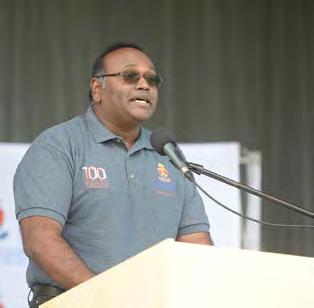
2 minute read
Supporting First-year Studies by Distributing Workload
Supporting First-year Studies by Distributing Workload
Dr Ruric Vogel, a senior lecturer in the Additional Chemistry modules for first- and secondyear engineering students in the Engineering Augmented Degree Programme (ENGAGE), focuses on problem-solving by breaking difficult content into manageable chunks. With PhDs in both organic chemistry and psychology, he is perfectly suited to guide first-year students who need help coping with the academic demands of university study. ENGAGE is a five-year undergraduate programme that provides a carefully structured curriculum to help students adjust to university life and cope with the challenges related to engineering studies. In this programme, the volume of work is gradually increased, while the support provided is correspondingly decreased over a period of three years. The students work in parallel with the mainstream students, but in smaller groups, with classes seldom exceeding 50 students. They attend a theory lecture once a week, followed by practice classes three times a week, with a greater emphasis on application, where the essence is isolated and problem areas identified.
This programme is mainly chosen by students who face challenges related to an inadequate background knowledge in mathematics and physical science, academic literacy and information technology, and who may not have effective study skills to cope with the mainstream four-year programme. The students who follow this programme benefit from Dr Vogel’s unique approach to teaching and are able to join the mainstream programme from their second academic year of study.
Central to his approach to supporting students to cope with the academic demands of tertiary study is his commitment to his students. He enjoys working with people and cares for his students. As such, he has a good rapport with them, which helps give them the confidence they need to approach him with problems they might experience with the subject content. He also believes that it is important to get to know the individual sitting in front of him in the classroom. Dr Vogel finds that students are better able to grasp the theoretical nature of chemistry if he presents it to them in the form of an analogue or a metaphor.
Finally, he emphasises the importance of recognising one’s identity. As a lecturer, he is of the opinion that teaching must be part of one’s essence: it must be who you are. In a similar vein, he encourages his students to determine whether they identify with being an engineer, which is an important element in ensuring their academic success.










